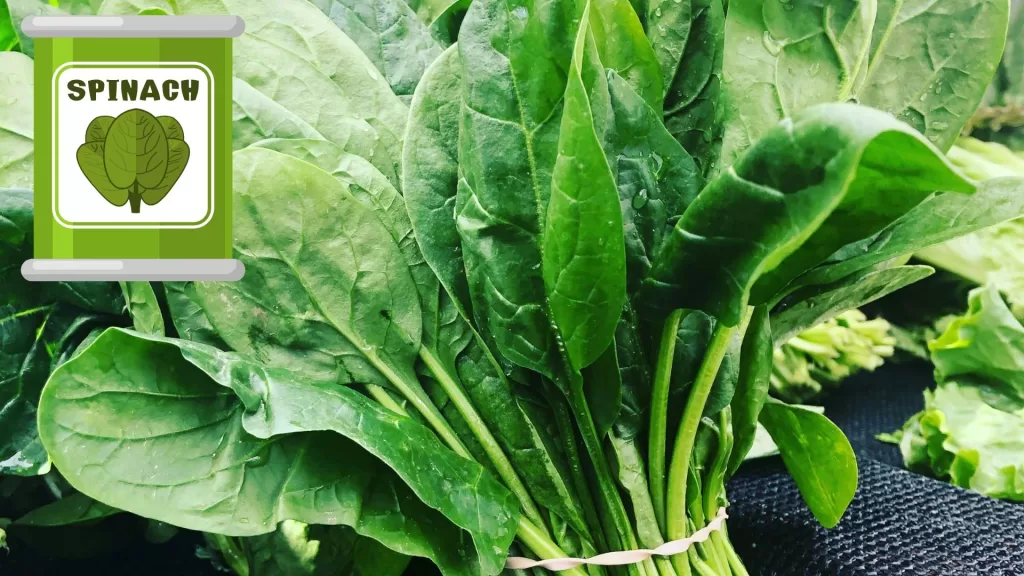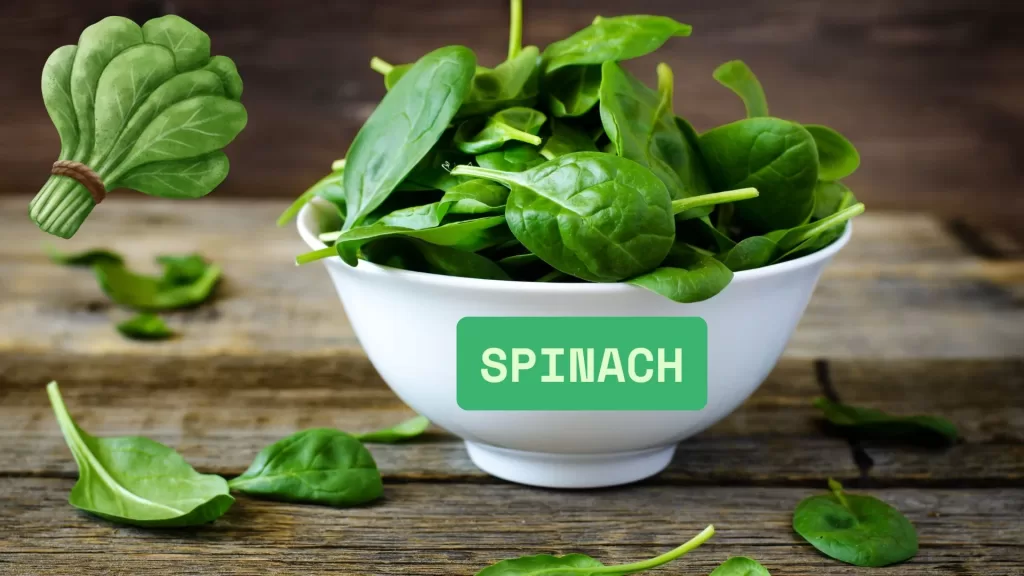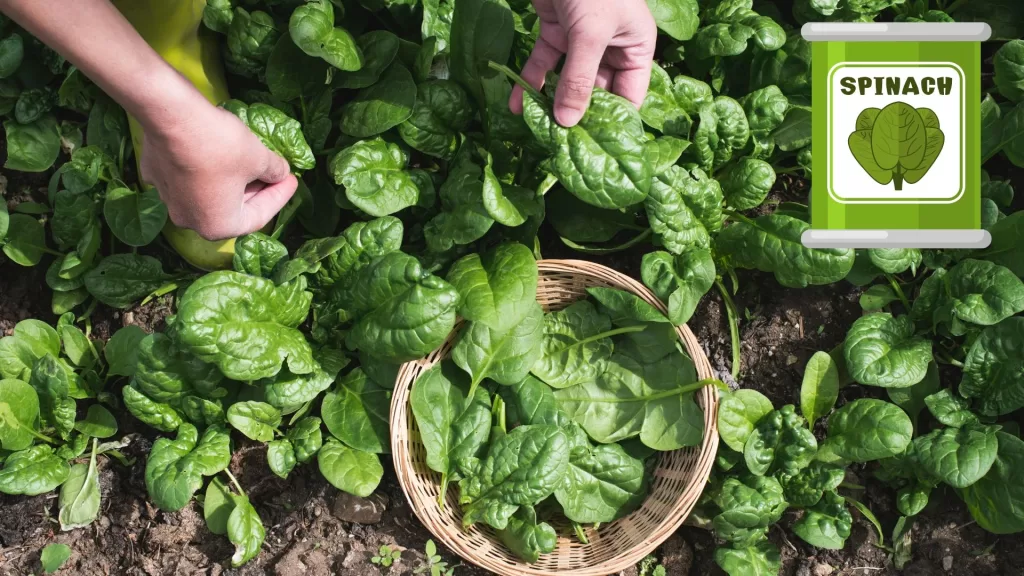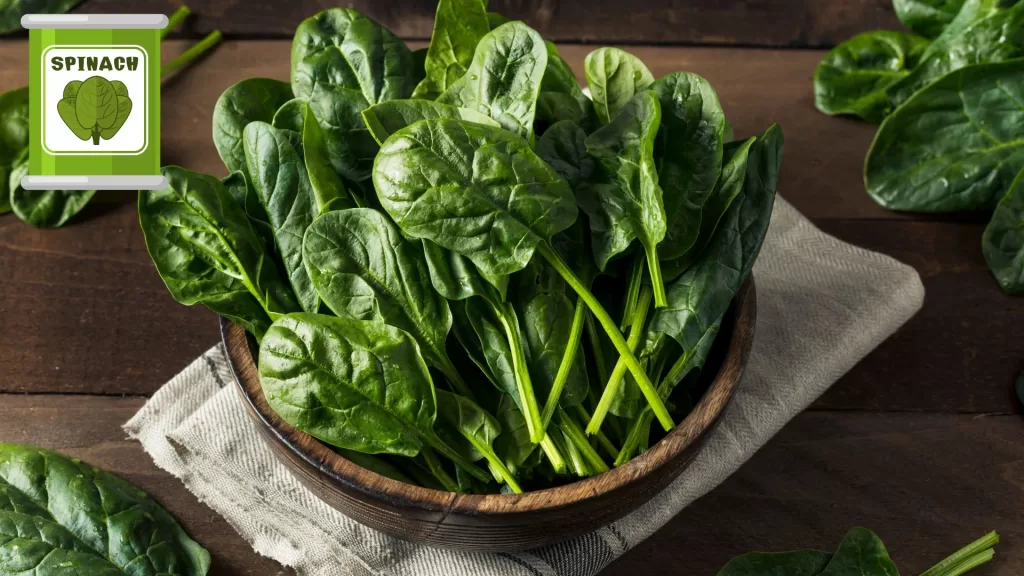Are you wanting to increase your health with a simple meal addition? Spinach can be precisely what you need. This leafy green powerhouse has been a favorite among health aficionados for years, for good cause. In this post, we’ll cover the top 10 health benefits of spinach that make it a must-have in your diet.

Key Points
Before diving into the detailed top 10 health benefits of spinach, here are the essential points to remember:
- Spinach is incredibly nutrient-dense with few calories.
- Regular drinking may help prevent various chronic illnesses.
- Both fresh and cooked spinach provide health advantages, but in different ways.
- Most individuals may safely consume spinach as part of a balanced diet.
- Adding spinach to your meals is one of the easiest methods to enhance your nutrition.
Introduction: Health Benefits of Spinach
Spinach is that versatile green leaf that Popeye made famous, but its benefits go far beyond cartoon strength. Whether blended into smoothies, tossed in salads, or cooked into your favorite dishes, spinach offers an impressive array of nutrients that support overall health.
Many people know spinach is “good for you,” but few understand just how many ways it can improve your health. From boosting immunity to enhancing skin appearance, the top 10 health benefits of spinach might surprise you. Let’s dive into why this humble leafy green deserves a regular spot on your plate.
What is Spinach?
Scientifically called Spinacia oleracea, spinach is a leafy green vegetable high in nutrients. Originally from old Persia, it is a member of the Amaranthaceae family. Popular for its soft leaves and subdued taste, spinach is eaten raw in salads or cooked in a range of cuisines. Though low in calories, it’s abundant in vital minerals like iron, calcium, vitamin A, vitamin C, vitamin K, and folate. Bone strength, immunity, and eye health all benefit from spinach. Savoy, semi-savoy, and flat-leaf types abound here. Easy to cultivate and flexible in the kitchen, spinach is a mainstay of many diets for health.
Before exploring the top 10 health benefits of spinach, let’s understand what makes this vegetable so special.

Nutritional Profile of Spinach
Spinach is incredibly nutrient-dense, meaning it provides a wealth of vitamins and minerals with very few calories. Just one cup (30 grams) of raw spinach contains:
- Calories: 7
- Protein: 0.9 grams
- Carbohydrates: 1.1 grams
- Fiber: 0.7 grams
- Vitamin A: 56% of the Daily Value (DV)
- Vitamin K: 121% of the DV
- Folate: 15% of the DV
- Vitamin C: 14% of the DV
- Iron: 5% of the DV
- Calcium: 3% of the DV
- Potassium: 5% of the DV
This impressive nutritional content is why spinach ranks high on lists of superfoods and contributes to the numerous health benefits of spinach we’ll discuss. Harvard T.H. Chan School of Public Health
Different Varieties of Spinach
There are three primary varieties of spinach usually seen in markets:
- Savoy spinach: Features dark green, crinkly leaves with a crisp texture
- Semi-savoy spinach: Has slightly crinkled leaves and is simpler to clean
- Flat/smooth leaf spinach: Features smooth leaves and is simplest to clean, widely used in processed meals
Each kind provides equal nutritional advantages, so you may select depending on your taste preferences and intended application.
The Top 10 Health Benefits of Spinach
Among the numerous health benefits spinach gives are an increased immune system, stronger bones, and better eye health. It’s rich in iron for energy, antioxidants for cell protection, and vitamin K for blood clotting. With fiber, spinach stimulates digestion; it also decreases inflammation and helps manage blood pressure, and supports heart health. Its folate content supports brain and prenatal wellness. Low-calorie spinach is ideal for overall health and weight management.

Now let’s explore in detail the remarkable ways spinach can enhance your health:
Benefit #1: Rich in Nutrients but Low in Calories
Spinach gives you incredible nutritional bang for your buck. With just 7 calories per cup of raw spinach, you get significant amounts of vitamins A, C, K1, iron, calcium, and many other essential nutrients. This makes spinach perfect for those looking to maintain or lose weight while ensuring optimal nutrition.
The nutritional density of spinach means you can eat it liberally without worrying about calorie intake, making it a dieter’s dream food. National Institutes of Health
Benefit #2: Powerful Antioxidant Properties
Spinach is loaded with antioxidants that fight oxidative stress in your body. These include:
- Lutein and zeaxanthin: Protect your eyes from damage
- Quercetin and kaempferol: Linked to decreased inflammation and protection against chronic diseases
- Alpha-lipoic acid: May reduce blood sugar levels and increase insulin sensitivity
These powerful compounds help neutralize free radicals that can damage cells and lead to chronic conditions like heart disease and cancer. Regular consumption of antioxidant-rich foods like spinach is one of the best things you can do for long-term health.
Benefit #3: Promotes Eye Health
Among the most celebrated health advantages of spinach is its ability to protect and retain eyesight. The lutein and zeaxanthin in spinach function as a natural sunscreen for your eyes and help prevent age-related macular degeneration and cataracts.
Studies reveal that those who eat spinach frequently have a much decreased chance of having eye impairments as they age. These preventive chemicals function by blocking damaging blue light and avoiding oxidative damage to the sensitive tissues of your eyes. American Optometric Association
Benefit #4: Reduces Blood Pressure
High blood pressure is a key risk factor for heart disease and stroke. Spinach includes natural nitrates that may help lower blood pressure levels. These nitrates are turned in the body to nitric oxide, which relaxes blood vessels and enhances blood flow.
Research has indicated that ingesting nitrate-rich foods like spinach may lead to small but considerable decreases in blood pressure, especially systolic blood pressure. This action makes spinach an ideal supplement to heart-healthy diets.
Benefit #5: Improves Heart Health
Heart disease remains the leading cause of death worldwide, making the heart-protective benefits of spinach particularly valuable. Spinach helps your heart in multiple ways:
- The nitrates improve blood vessel function
- The antioxidants reduce inflammation
- The fiber helps lower cholesterol levels
- The potassium helps regulate heart rhythm and blood pressure
These combined effects make spinach one of the best foods for cardiovascular health. Studies have associated regular consumption of leafy greens like spinach with a significantly reduced risk of heart disease. American Heart Association
Benefit #6: Helps Prevent Cancer
Several compounds in spinach have been studied for their potential anti-cancer properties. Spinach contains unique flavonoids called methylenedioxyflavonol glucuronides that have shown promise in slowing cancer cell growth.
Additionally, the high levels of chlorophyll in spinach may block the carcinogenic effects of heterocyclic amines generated when grilling foods at high temperatures. While more research is needed, the preliminary evidence supports including spinach as part of a cancer-preventive diet. National Cancer Institute
Benefit #7: Supports Brain Health
The neuroprotective benefits of spinach are becoming increasingly recognized. The vitamin K, folate, and various antioxidants in spinach support brain health in several ways:
- Help maintain cognitive function as you age
- May slow the progression of Alzheimer’s disease
- Support the formation of neural connections
- Protect brain cells from oxidative stress
One study found that people who ate just one serving of leafy greens like spinach daily had the cognitive abilities of someone 11 years younger compared to those who rarely ate these vegetables. Neurology Journal
Benefit #8: Benefits Skin Health
Your skin will reward you for eating spinach frequently. The vitamin A in spinach helps maintain and repair skin tissues, while vitamin C encourages collagen formation for skin firmness and suppleness. The antioxidants protect skin cells from damage caused by UV radiation and environmental contaminants.
Many dermatologists prescribe spinach as part of a skin-nourishing diet. Regular use may help enhance skin tone, minimize acne, and delay the aging process of your skin.
Benefit #9: Strengthens Bone Health
Spinach is packed with nutrients that support bone health, including:
- Vitamin K: Critical for bone formation and strength
- Calcium: The building block of bones
- Magnesium: Helps activate vitamin D, which aids calcium absorption
- Manganese: Supports bone mineral density
The top 10 health benefits of spinach wouldn’t be complete without mentioning its role in preventing osteoporosis and maintaining strong bones throughout life, especially as we age. International Osteoporosis Foundation
Benefit #10: Aids in Digestive Health
Spinach contains both soluble and insoluble fiber, which work together to promote digestive health. The fiber in spinach:
- Prevents constipation and promotes regularity
- Feeds beneficial gut bacteria
- Helps maintain intestinal wall integrity
- May reduce the risk of colorectal cancer
Additionally, the magnesium in spinach helps relax digestive muscles, potentially reducing symptoms of digestive disorders like IBS. American Gut Project
Comparison Table: Spinach vs. Other Leafy Greens
To truly appreciate the health benefits of spinach, let’s compare its nutritional profile with other popular leafy greens (per 100g serving):
| Nutrient | Spinach | Kale | Romaine Lettuce | Swiss Chard |
|---|---|---|---|---|
| Calories | 23 | 49 | 17 | 19 |
| Protein (g) | 2.9 | 4.3 | 1.2 | 1.8 |
| Vitamin A (% DV) | 188% | 308% | 174% | 44% |
| Vitamin K (% DV) | 604% | 1062% | 129% | 830% |
| Vitamin C (% DV) | 47% | 200% | 40% | 33% |
| Folate (% DV) | 49% | 19% | 38% | 4% |
| Iron (% DV) | 15% | 7% | 5% | 10% |
| Calcium (% DV) | 10% | 15% | 3% | 10% |
As you can see, spinach offers an excellent balance of nutrients compared to other greens and particularly excels in folate and iron content. USDA Food Data Central
How to Include More Spinach in Your Diet
Now that you know the top 10 health benefits of spinach, here are some easy ways to incorporate more of this superfood into your daily meals:

Simple Spinach Recipes
- Morning Green Smoothie: Blend spinach with banana, almond milk, and a spoonful of nut butter.
- Spinach Omelet: Add chopped spinach to your morning eggs.
- Lunch Spinach Salad: Toss fresh spinach with strawberries, nuts, and balsamic vinaigrette.
- Spinach Pesto: Blend spinach, basil, pine nuts, garlic, parmesan, and olive oil for pasta or sandwiches.
- Dinner Spinach Stir-Fry: Sauté spinach with garlic and olive oil as a quick side dish.
Storage and Preparation Tips
- Store unwashed spinach in the refrigerator with paper towels to absorb moisture.
- Wash well before eating to eliminate any grit.
- For optimal nourishment, consume fresh or minimally cooked (a brief sauté maintains more nutrients than boiling).
- Frozen spinach is almost as healthful as fresh and more handy for certain recipes.
Daily Recommended Intake
There’s no strict limit on spinach consumption for most people, but a good target is 1-2 cups of leafy greens daily, including spinach. Variety remains important, so rotate spinach with other healthy vegetables throughout the week.
Pros and Cons of Spinach
Spinach is filled with vitamins, minerals, and antioxidants that promote heart, bone, and eye health. It’s low in calories, making it perfect for weight reduction and general well-being. However, it includes oxalates, which may interfere with calcium absorption and lead to kidney stones in susceptible people. Excessive consumption might also impact thyroid function. Moderation and adequate planning assist in enhancing benefits while limiting possible negatives.
Pros
- Exceptionally nutrient-dense.
- Versatile in cooking.
- Easily accessible and affordable.
- Available year-round.
- It can be enjoyed raw or cooked.
- Mild flavor that complements many dishes.
- Quick to prepare.
- Freezes well for longer storage.
Cons
- Contains oxalates that may contribute to kidney stone formation in susceptible individuals
- May interfere with blood-thinning medications due to vitamin K content
- Can contain pesticide residues if not organic (consider washing thoroughly)
- May cause bloating in some people due to fiber content
- Loses volume dramatically when cooked, requiring large quantities for cooked dishes
Public Reviews About the Health Benefits of Spinach
Here’s what real people are saying about adding spinach to their diets:
“After just one month, I noticed that my skin looked clearer and that I had a lot more energy throughout the day after I started adding a handful of spinach to my morning smoothie every day.” Maria S., age 34.
“Because of its lutein concentration, my eye doctor especially suggested spinach to me since I have a family history of macular degeneration. My vision has remained stable since making it a regular part of my diet.” – Robert T., 58
“I was anemic, and my doctor suggested increasing my spinach intake along with other iron-rich foods. Combined with my iron supplement, my levels improved much faster than expected.” – Jasmine K., 42
“My kids were picky eaters until I started blending spinach into pasta sauces and smoothies. Now they’re getting the nutrients they need without the complaints!” – David M., 39
Potential Drawbacks of Spinach
While the health benefits of spinach are impressive, there are some considerations to keep in mind:
Who Should Limit Spinach Consumption
- People with a kidney stone history: The oxalates in spinach may lead to kidney stone development in sensitive people.
- Those using blood thinners: The high vitamin K concentration may conflict with drugs like warfarin.
- People with specific digestive conditions: Some may notice increased gas or bloating from the fiber.
Possible Side Effects
Most people can eat spinach without any issues, but some potential side effects include:
- Digestive pain from the fiber content (typically after quickly increasing consumption)
- Tooth discolouration from pigments (temporary and reversible with brushing)
- Potential for pesticide exposure if not organic or thoroughly washed
- Rare allergy responses in susceptible persons
If you have any concerns, contact your healthcare professional about the recommended quantity of spinach for your unique case.
Video Reviews: Health Benefits of Spinach
Conclusion
The top 10 health benefits of spinach we’ve explored demonstrate why this leafy green deserves its superfood status. From supporting eye health to strengthening bones, improving heart function to enhancing brain performance, spinach offers an impressive array of health advantages in a low-calorie package.
By incorporating spinach into your daily diet through smoothies, salads, or cooked dishes, you’re making a simple choice that can have profound effects on your long-term health. Remember that consistency is key—the benefits come from regular consumption over time.
Whether you’re trying to improve a specific health condition or simply optimize your overall well-being, spinach is one of the most accessible, affordable, and effective foods you can choose. So next time you’re at the grocery store, don’t forget to add some of this nutritional powerhouse to your cart!
Frequently Asked Questions About Spinach
Read here the most important frequently asked questions about the top 10 health benefits of spinach. It will help you gain better knowledge and information.
Is raw or cooked spinach healthier?
Both fresh and cooked spinach provide health advantages, but in different ways. Raw spinach has greater quantities of key elements, such as vitamin C and niacin, that are sensitive to heat. However, boiling spinach breaks down the cell walls, making other minerals like iron and calcium more accessible. Lightly sautéing spinach is frequently a nice middle ground to protect heat-sensitive elements while boosting the absorption of others.
How much spinach should I eat per day?
For most individuals, 1-2 cups of leafy greens a day is a decent objective, with spinach making up a chunk of it. There’s no definite top limit for most individuals, but it’s always wise to diversify your vegetable consumption for a broad spectrum of nutrients. Those with particular health issues, like kidney stones or those on blood thinners, should visit their healthcare professional for specialized suggestions.
Can spinach help with weight loss?
Spinach may be a great ally in weight control because of its high nutritional richness and low calorie count. It delivers volume and fiber to help you feel full while adding a few calories to meals. Studies show that including low-energy-dense items like spinach in your diet might help lower total calorie consumption without feeling deprived.
Does spinach cause kidney stones?
Spinach contains oxalates, which can contribute to the formation of calcium oxalate kidney stones in susceptible individuals. If you have a history of kidney stones, you may need to moderate your spinach intake. However, for most healthy people without this condition, the health benefits of spinach far outweigh this potential risk. Staying well-hydrated when consuming high-oxalate foods can also help reduce risk. National Kidney Foundation
Is frozen spinach as healthy as fresh spinach?
Frozen spinach is nearly as nutritious as fresh spinach and sometimes even more so, as it’s typically frozen at peak freshness, preserving nutrients. While there may be slight losses in vitamin C during the blanching process, other nutrients remain well-preserved. Frozen spinach is also more convenient, has a longer shelf life, and reduces food waste, making it an excellent practical option for reaping the top 10 health benefits of spinach.
Authors’ Remarks:
I am Nirmala Das, a healthcare expert and consultant, certified by the BIAHS. With a passion for promoting wellness, I provide accurate, practical insights. This article offers valuable information to support your health journey and empower better lifestyle choices.
You can visit our site daily to get the latest information about health, fitness, your daily recipes, Nutrition facts, healthcare, and wellness Insights. For more information, please visit our website, The 9nn Times.
Disclaimer
The material presented in this article is for informative purposes only and should not be taken as legal advice. While attempts have been taken to ensure accuracy and reliability, no assurances are provided on the completeness or usefulness of the material. The author and publisher assume no responsibility for any actions made based on the information included in this article. Any links to external resources are given for convenience and do not require information sponsorship.